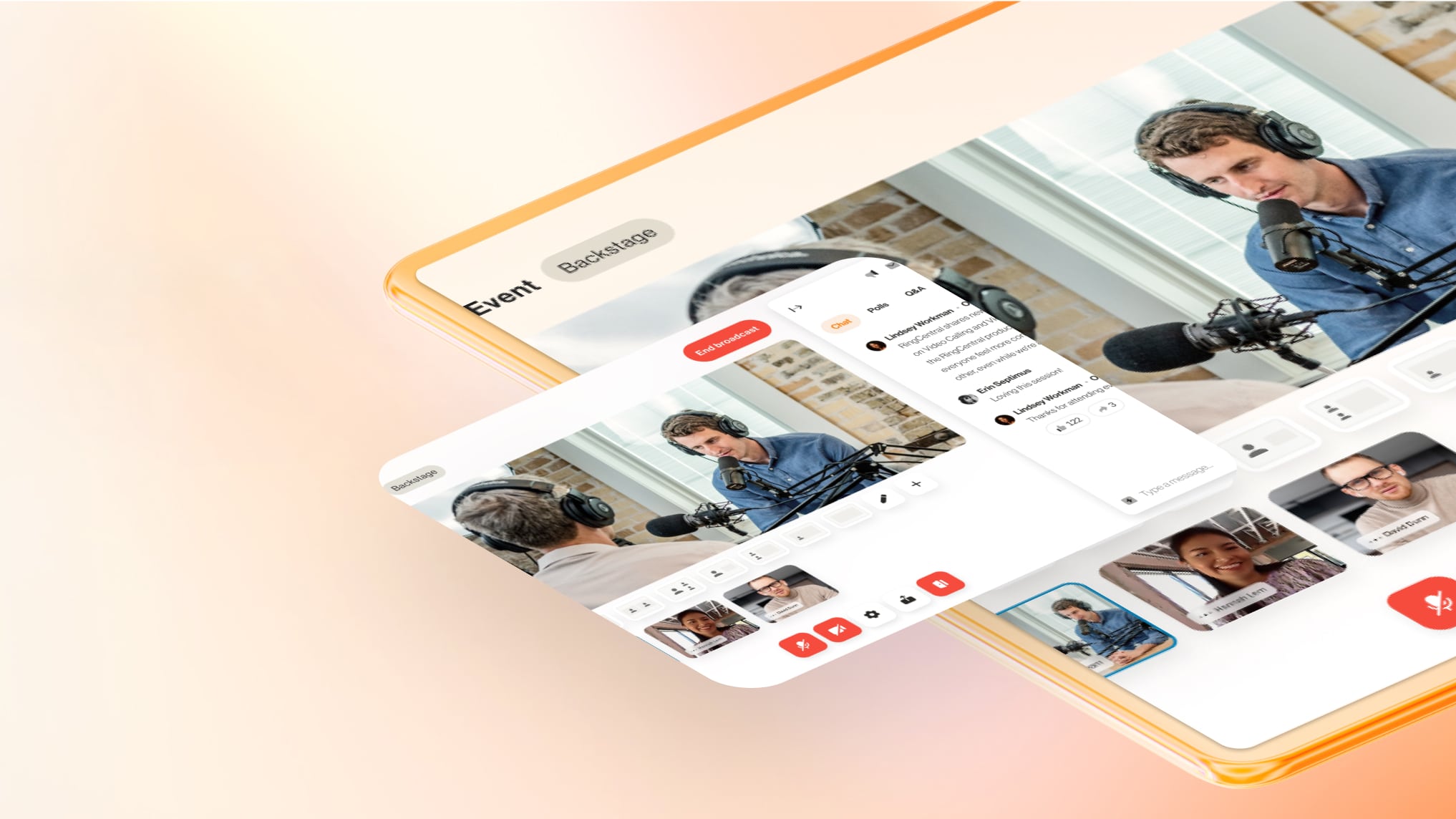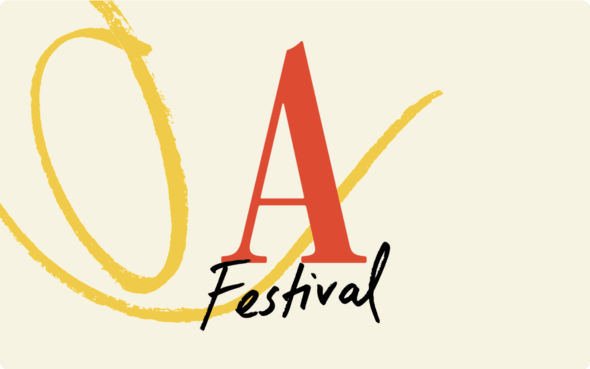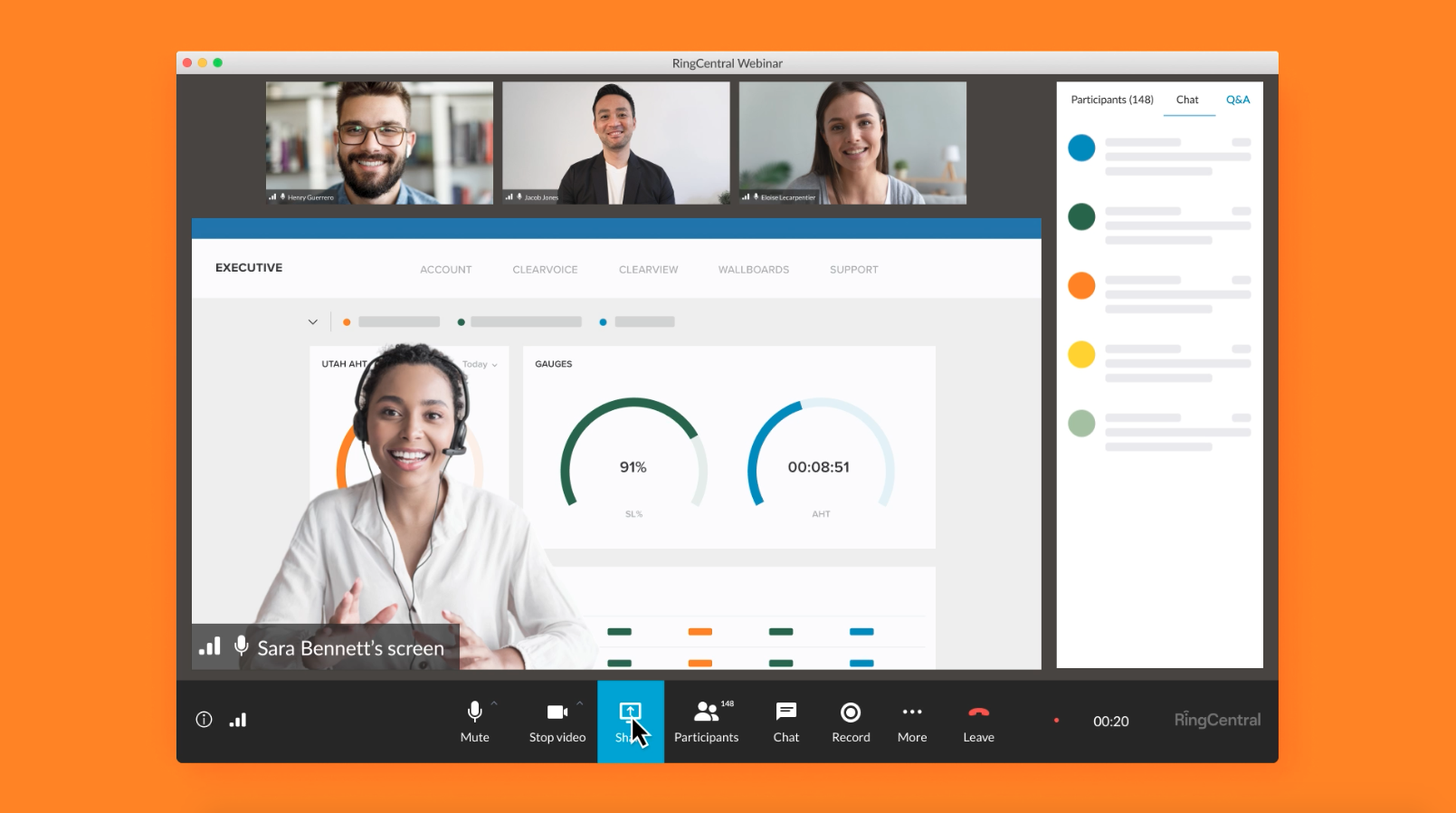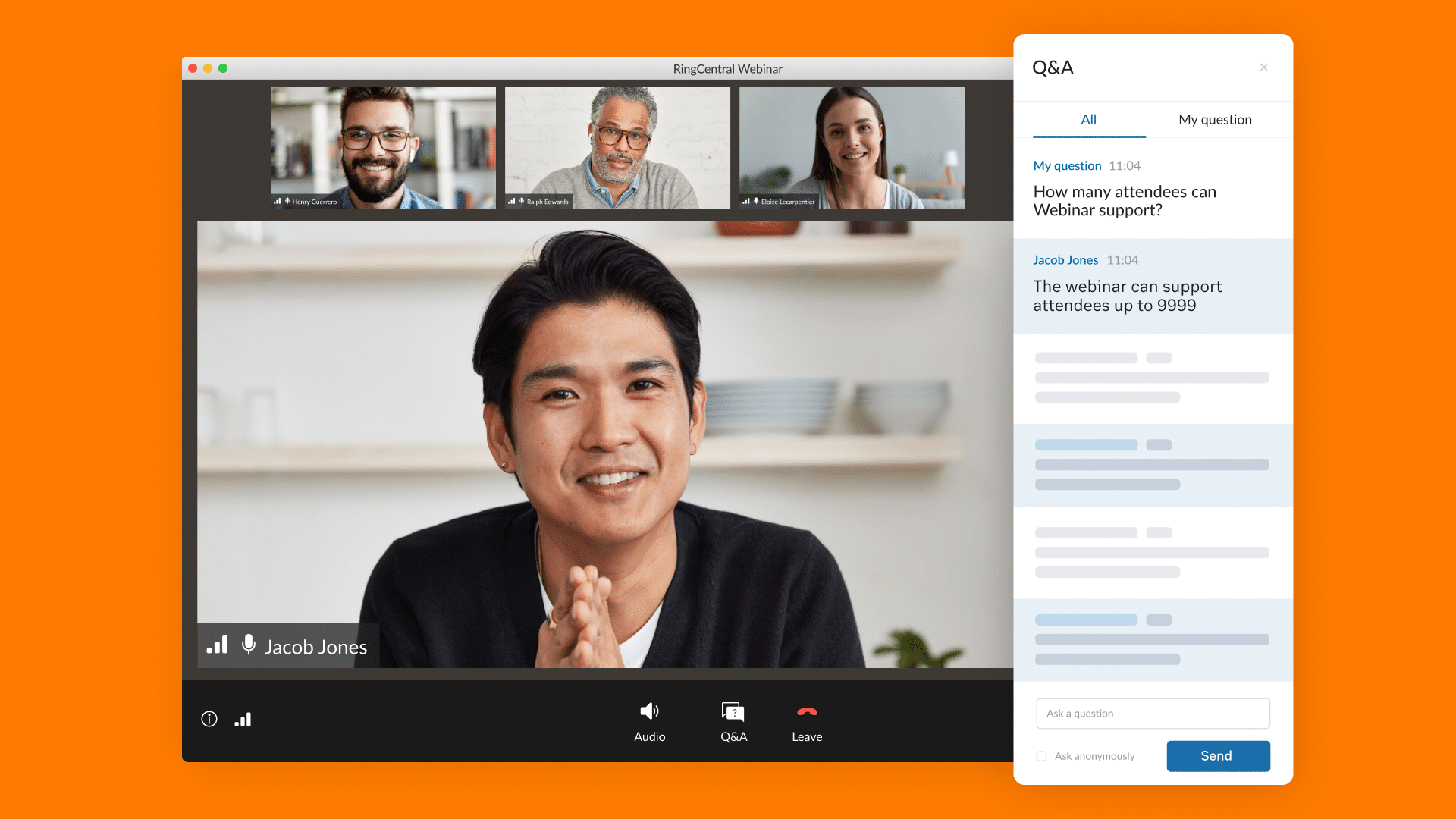Hopin is now RingCentral Events
Today’s event landscape is getting pretty crowded, especially as an increasing number of virtual events pop onto the calendar. The result? More events, like yours, competing for people’s time and attention –– after all, they don’t call it “the attention economy” for nothing.
Effective event marketing can make or break your success when it comes to capturing that attention and getting people to register for –– and ultimately attend –– your event. So, how can you get your target audience to choose your event over others?
Read on for some advice on how to make sure your event stands out to potential registrants. Plus, get a list of 24 event promotion ideas you can start testing today.
How to promote an event like a pro
Event promotion and marketing is all about using smart strategies –– and getting a little creative –– to pique audience interest and drive event registrations (including ticket sales). It’s essential because no one will even think to show up to your event if you don’t let your audience know it’s happening.
Driving registrations and attendance begins with having a firm grasp on your event’s goals and target audience.
Get to know your target audience
66% of customers say they expect companies to understand their needs and expectations. If you’re out of touch with your audience’s wants, needs, and motivations, getting them to pay attention to your event will be a true uphill battle. So, start by conducting in-depth research on the attendees you’re seeking to attract.
Consider using free online tools and resources, like GoogleTrends, AnswerThePublic, and Pew Research Center, to help you collect some vital information on your target audience, such as:
- Demographics and psychographics
- Top influencers and media outlets
- Popular interest areas and topics
- Marketing channel preferences
- Shared values and motivators
- Key need states or challenges
- Online behaviors and habits
An in-depth understanding of your audience can help you determine what marketing channels, promotional tactics, and messaging will set you up to successfully reach, engage, and convert potential attendees.
It can also indicate how well your event promotions will resonate with potential attendees and inspire how you’ll communicate with them about the value your event will deliver.
Document your key audience information in your event brief, and use the same resource to help you tackle another crucial task: nailing down your event marketing goals and objectives.
Set your marketing goals and success metrics
As you’re researching your audience, you’ll also want to outline the specific your event marketing activities are set to achieve. To start, ask yourself how you’ll measure your event’s return on investment (ROI).
For example, let’s say your event needs to attract 100 new prospective clients to produce a positive ROI. And based on past experience, you know that for every three registrants, you’ll net about one new potential customer. A bit of quick math suggests your event marketing efforts will need to drive 300 event registrations.
Understanding your end goal in addition to your audience will help you determine the event promotion strategy you’ll use to hit — or, better yet, exceed — your registration, attendance, and other measurable targets.
You’ll also net out with some insight into the cash required to make your event marketing magic happen. Put it all in your event budget so you have a consistent handle on what’s possible and how much you’ve spent to date.
24 Event Promotion Ideas
Ready to test out some event promotion tactics? Mix and match these 24 ideas to attract your target audience and meet your event marketing goals –– with any budget, on any timeline.
1. Create a stand-out event website
An event website is more of a “need to have” than a “nice to have” in 2022. After all, it’s open 24 hours a day and it serves as the landing page for most, if not all, of your event promotions.
So, think of your website as the front door to your event and use it as a home base for all your key information. Begin with the most important details first, then the rest of the information can follow. At a minimum, consider including these elements:
- Date
- Time
- Description
- Agenda
- Speakers
- Sponsors
And remember, first impressions count. In fact, studies show you have only a fraction of a second to convince website visitors to stay on a page. So while your event website should be an information powerhouse, it should also be a place that conveys your event’s value proposition and captures your audience’s attention.
Consider these tips to immerse potential attendees in an optimal event website experience:
- Focus on design: Design the site to entice your audience, using photos, videos, and eye-catching event branding. You can incorporate different branding materials like logos, brand colors, and other graphics to stay consistent throughout your marketing efforts.
- Implement clear calls to action (CTAs): Strategically place CTAs in highly visible areas across your website to make registering for your event a seamless and simple process. You might want to test CTA placement, copy, and even button color to see what drives results.
- Include sharing functionality: Include social media and email sharing buttons so your future attendees can easily help you spread the word.
- Optimize for search engines: You’ll attract more visitors to your website if you optimize it to play well with search engines. Consider helpful tools like Moz and Ubersuggest to employ some basic search engine optimization (SEO) tactics like helping search engines find and crawl your site through simple navigation, conducting keyword research to determine what you want to rank for based on your audience, and creating high-quality on-site content that includes keywords from your research.
2. Offer early bird registration
Incentivize your audience to take action early. Early bird registration is a period of time when people can sign up to attend your next show before ticket prices increase. It sometimes launches during an existing live event or shortly thereafter.
Consider tapping into that good ol’ fear of missing out by including a countdown on your registration page that indicates how many days, hours, or minutes are left to take advantage of the discounted early bird ticket price.
Time-bound ticketing strategies can help you increase event registration.
People also tend to place a higher value on things when they’re in limited supply –– remember the great international toilet paper shortage of 2020? That’s why scarcity is particularly powerful. So, similarly to time-bound discounts, offering a limited number of tickets can compel prospective attendees to purchase quickly before the opportunity is gone.
Alternatively, your audience might be motivated by social currency (or others’ perception of a person’s influence and success). For many people building social currency means finding ways to shed a positive public light on themselves and signaling they’re “in the know” to those around them.
This dynamic can open doors to effective event promotions. Consider the way you’d feel if you snagged exclusive tickets to an event or scored a VIP experience. Would you brag about it to your friends?
Think about tapping into that kind of experience with add-ons like:
- Premium swag bags
- VIP networking lounges
- Special access to event content
- Celebrity or speaker meet-and-greets
- Invite-only wine, coffee, or gourmet food tastings
- Exclusive access to private workshops or activities
The novelty and prestige of exclusivity-based promotions not only help compel people to register. They can also be priced at a premium to generate additional ticket sales and revenue streams for your event.
3. Consider free event marketplaces
Want to help a fresh set of attendees find your event? Try listing it on free event marketplaces where people look to find out about new and upcoming events.
These marketplaces are an event marketer’s dream because people who are in the market to attend an experience can actively search these platforms for future events they’re interested in. RingCentral Events Explore, for example, is an integrated event marketplace and a one-stop shop for organizers who want to give their event an extra promotional boost.
4. Employ personalized email marketing
Email marketing is an efficient and inexpensive way to promote your event. But it comes with a caveat: Your emails have to cut through the noise to grab recipients’ attention. So, avoid sending out generic, or one-size-fits-all, email communications.
Instead, opt for a more individualized approach. 80% of people say they’re more likely to make a purchase if they get a personalized experience. Beyond that, most marketers say personalization is essential to email marketing success.
Maximize your success by:
- Segmenting your databases to identify people who have shared characteristics
- Tailoring email messaging to recipients’ needs and interests
- Customizing calls-to-action (CTAs) based on email engagement metrics
- Creating relevant subject lines based on popular topics or past attendance
- A/B testing subject lines, content, and CTAs, then optimizing based on results
You can even get your colleagues in on the email action to give your promotions an added boost. Ask your coworkers to send personal emails to their customers, prospects, partners, or other people in their networks. And, provide your team with the link to your event website, so they can add it to their email signature lines.
5. Hail content as event marketing’s king
Have you diligently researched a product or service before making a purchase? If so, you aren’t alone –– 53% of buyers do the same.
Help tip the scales in your favor by giving your audience a taste of the event experience that awaits them. And use compelling content as the vehicle to bring your story to life.
Think of “content” as an umbrella term covering videos, webinars, editorial, podcasts, white papers, social media posts, case studies, and more. It’s a long list.
So, how can event professionals use content to drive registrations and attendance? High-quality content often involves a significant amount of work, but consider these possibilities to lighten the load:
- Partner with brands and creators who can contribute valuable content.
- Tap into subject matter experts and content creators within your organization.
- Share testimonials and stories from past event attendees and partners.
- Repurpose existing content from previous events.
Repurposing content alleviates the pressure of spinning up something new every time. Instead, you can take what you already have and reshape it for different uses.
6. Partner up on event promotion
You know the old saying: You scratch my back, and I’ll scratch yours. Get a promotional boost by taking a symbiotic approach to marketing your event. Seek to join forces with sponsors, speakers, and other event partners to expand your overall audience reach.
Wondering how to get your partners involved in your event promotion? Here are a few examples to get you started:
- Invite speakers or sponsors to author guest blog posts that give potential attendees a glimpse into all they can learn at your event and give them yet another reason to register.
- Provide speakers, partners, sponsors, and attendees pre-written email templates and content so it’s easy for them to share event promotions with their audiences.
- Send engaging social media posts and visual assets promoting the event to your key partners to post and share with their online networks. Not only will they stand to benefit from the pre-event publicity, but they’ll also get a head start on engaging with your shared event community.
7. Host pre-event webinars and podcasts
Nearly 40% of business-to-business buyers prefer webinars for researching purchases, and in 2022, a projected 424.2 million people will listen to podcasts worldwide. So, use the target audience’s quest for knowledge to your advantage by hosting webinars and podcasts centered around your event.
Not quite sure what to talk about? Touch on topics related to your event’s pillars. Invite guests, answer questions, and leave your audience eager to learn more. Speaking of, don’t forget to plug your event in your podcast or webinars. And, be sure to provide your viewing or listening audiences’ with details around your event and how they can easily register to attend.
Webinars and podcasts can help you speak to a larger potential pool of attendees. But to make an even bigger splash, set your sights on the media.
8. Score attention from the press
Readers and journalists value the trustworthiness of a press release and engaging, newsworthy ones command the most attention.
Craft a press release (or, better yet, lean on your public relations team to help) and include links to your event website. Then, use your press release to pitch targeted members of the press by highlighting stories with unique, evergreen, and timely angles aligned with different media outlets’ topics and reader bases.
For more tips about how to garner press coverage for your event, check out this BizBash article. Looking for some additional support? Check out our agency marketplace or consider hiring a freelance PR consultant to get some expert help promoting and publicizing your event.
9. Lean into free ticket donations
Contemplate donating tickets to a non-profit organization or association to increase awareness of your event. While you’re spreading the love, your event will reap the benefits because today’s audiences admire brands aligned with their social values and causes.
Take it a step further by fundraising for a good cause during your live event. This paints your event in a flattering light because charitable giving affects nearly three-quarters (73%) of consumers’ spending decisions.
For example, Broadway Unlocked hosted a 600-person virtual gala that raised more than $300,000 for Cancer Support Community. Events with this level of philanthropic impact deserve to be noticed.
10. Speak out to today’s event audiences
Want to build more hype? Then, aim to be visible (or audible). Tap partners and people within your organization to speak at other events with audiences similar to the one you’re looking to attract.
Advise your speakers to build their presentations around a thought leadership-led topic that’s tangentially related to your event. After they’ve wowed the audience by dropping knowledge bombs, they can end their presentation by inviting potential attendees to learn more by registering for your upcoming event.
11. Design eye-catching event infographics
Since people retain 80% of what they see, design infographics to market your event in a visually appealing and easy-to-understand way.
While people can typically process an image in 13 milliseconds, the average person reads approximately 240 words per minute. So, infographics are a great way to present the key event information you want your audience to remember and share.
Nearly two-thirds of consumers want companies to connect with them on social media. With that in mind, post infographics on social channels to help gain traction.
12. Use an #eventhashtag on social media
How else can you snag a little social media traction for your event? Provide your community with an event hashtag so they can keep up on the latest event news and conversation. Include your hashtag in the promotional content you share online to build anticipation and enthusiasm for your event.
Using an event hashtag also provides your community with a way to stay connected while sharing user-generated content (UGC). This not only tightens bonds within your community. The resulting UGC and word-of-mouth marketing can also help attract more potential attendees and, in turn, increase ticket sales and registrations.
Keep the social conversations going by including your hashtag in the posts you share pre-, during, and post-event. And make it easy for your event community to continue interacting on social channels using one familiar, easy-to-remember hashtag. Just make sure your chosen hashtag hasn’t already been used for something else.
13. Use video to tease your event
Remember how people retain 80% of what they see? Well, beyond that, 88% of people say a brand’s video has convinced them to make a purchase. Go beyond creating infographics with videos, motion-graphics, and short-form filmed testimonials to share on social media channels.
For example, behind-the-scenes, sneak-peek videos give the event audience a glimpse into the valuable experience awaiting them. Not only does video build enthusiasm, it also increases the likelihood of social sharing because it follows the maxim: “Show. Don’t tell.” Plus, many social media algorithms reportedly tend to favor video content.
Consider co-promoting your promotional videos with sponsors, speakers, and potential influencers on social media to reach a larger audience.
14. Live stream your event content
An impressive 80% of people would rather watch a company’s livestream than read its blog. It makes sense — they’re synchronously getting the most up-to-date and exciting scoop on an upcoming event. Plus, they can share their excitement with others in real time.
Live streaming your event to social media channels can help you score some last-minute registrations. Plus, you can repurpose the stream for additional marketing activities after the event is over. And getting more eyes on your social media feed helps grow your event community.
15. Invite influencers to help promote your event
By teaming up with influencers, you can seize the marketing moment — and their sway — to drive interest in attending your event.
Seven out of 10 marketers think influencer marketing reaches the right audience better than other marketing tactics. Why? Because influencers come with pre-existing genuine relationships with their audience.
Keep in mind that influencers typically charge a fee for their services. So, start by checking your event budget to make sure you have the funds you’ll need.
Start by selecting an influencer who aligns with the event’s mission and has built a strong following with the event audience you hope to attract. Then, seek to collaborate with an influencer to promote your event on social media, email, and other marketing channels.
Take the example of Scooter Taylor and Tre’Von Hill, influencers in their own right, who found themselves with extra time on their hands at the beginning of the pandemic. Four days after discovering RingCentral Events’ virtual event capabilities, they hosted QuarantineCon. They initially expected 500 attendees, but after Taylor and Hill tapped YouTube influencers, CEOs, music executives, and creatives to present, almost 4,500 people registered for the event.
QuarantineCon saw so much success that the event series continued. And it attracted more community members because attendees sang its praises.
16. Turn registrants into event ambassadors
Loyal community members already value your brand and are excited to attend your event. So why not let these folks help give your event promotion a boost?
Consider creating a referral program to incentivize loyal members of your audience to tout your event.
To get started, create shareable event marketing content that’s likely to resonate with your audience and then let your brand ambassadors do the rest. Don’t forget to provide them with referral codes so you can track how many new registrations result from their referrals. Then, think of some ways to express your gratitude to your event’s top evangelists like:
- Awarding them with VIP status
- Sending them exclusive event swag
- Sharing their user-generated content
- Discounting their registration fees and/or ticket upgrades
17. Run irresistibly fun social media contests
Games and friendly competition are often hard to resist (Wordle, anyone?). So, running social media contests and giveaways can inject an element of fun and playfulness into your event promotions.
- Start a motivating TikTok challenge
- Partner with event sponsors to host a themed giveaway
- Create a game that incentivizes attendees to interact to score pre-event swag
- Incentivize your audience to share ideas around a certain theme with a chance to win prizes (or have their idea featured)
Games and contests can also creatively nudge your event community to spread the word on social media.
18. Amplify the buzz with social advertising
Want to give your event a boost? Consider investing in paid advertising on social media platforms. While this event promotion idea comes with hard costs, it can be highly effective.
Make sure you understand how to target your audience so you’re getting the most bang for your buck. One tactic is to create look-a-like audiences based on your past events. This can help you reach new-but-similar audiences who are likely to be interested in your upcoming experience.
Additionally, think back to your audience research to determine which social media platform your audience prefers. That way, you’ll allocate your spend where it makes the most sense, and your social media promotions will run where similar online event communities can easily see them.
19. Stay top of mind with retargeting
Develop a safety net that catches potential registrants who might have slipped through the cracks for one reason or another. Search engine marketing (SEM) and social media retargeting are a few ways to keep your event top of mind and prompt ongoing consideration to attend.
Craft your ad copy, visuals, and CTAs so your retargeting efforts create a relevant experience for your potential registrants. Since retargeting is all about reaching people who have already interacted with your brand, your ads will be conveniently positioned where your audience hangs out online. And, your event promotions will continue to make cameos reminding people to register soon.
20. Orchestrate a celebrity surprise
How often do you listen to others’ stories of their brushes with famous people? Use the human inclination toward name dropping to your advantage. Celebrities, musicians, authors, and admired industry thought leaders are an irresistible way to attract event registrants.
That’s why Groupon is adding a dash of celebrity to its experiential marketing efforts by partnering with Rob Gronkowski to host a Super Bowl viewing party at Gronkowski’s mansion. Or consider the Wildlife Conservation Network inviting revered primatologist, Jane Goodall, to speak at their event.
Hinting at surprise celebrity appearances can pique audience curiosity and drive them to register for your event.
21. Offer pre-event gifts and experiences
Remember, you’re not promising to simply host an event. Rather, you’re promoting an exceptional experience to your target audience.
Tangible gifts and experiences help build relationships with potential attendees because providing them with something thoughtful encourages reciprocity. It’s a pretty powerful way to tempt people to register.
Select items and experiences that will complement your event’s theme and provide value in your audience’s day-to-day life. Let’s look at some creative ways to employ this event promotion:
- Partner with sponsors for a co-branded and memorable giveaway.
- Mail or virtually deliver swag that elevates your message.
- Promise at-event raffles to intensify registrants’ anticipation of the event.
- Treat attendees to virtual experiences like yoga, mixology, and cooking classes.
Aiming to offer value and delight at every touchpoint will have attendees eagerly recommending the event to everyone they think would benefit.
22. Inspire delight with direct mail
Have potential VIP or high-value attendees in mind? Make a strong first impression by sending a personalized experience in the mail (yes, we’re talking about snail mail) that promotes the event and prompts registrations.
Many marketers say that, while mailing print invitations does dip into the budget, campaigns using integrated direct mail tend to have a higher ROI than those without it.
How can you get the most potential for your postage? Send something that improves your VIPs’ quality of life instead of postcards that are immediately tossed in the recycling bin. For instance, frequent travelers may appreciate branded travel pillows, while remote workers might welcome a candle to burn while they take a break.
23. Secure sponsored slots in relevant newsletters
Look to expand your event registrations by securing a spot in a sponsored newsletter or email blast. This extends your reach by tapping into industry publications’ and media outlets’ email lists.
It’s important to note, however, that this event marketing tactic almost always comes with a price tag. So, be sure to understand a potential paid partner’s email audience and make sure it aligns with your target audience.
As for newsletter content, look no further than your existing event website, email copy, editorial content, and visual assets. By repurposing what you’ve already created to market your event, you’ll save time and money while getting your event into new inboxes.
24. Hire an event marketing agency
Event organizers can save time and stress by hiring an event marketing agency to support from start to finish. If budget and time allow, tap into the expertise of a specialized agency to guide (and execute) your event promotion.
Interested in taking this approach? Look to find an agency that specializes in event marketing and promotion. Or, try searching RingCentral Events’ agency marketplace to find a great promotional partner. Then, you can focus on event planning and management while they focus on marketing your show.
Enlist event technology to support your marketing efforts
Keep track of what promotional tactics work best as you work to reach your event goals. Then, optimize your approach based on your experience.
And if you want to take your event marketing to the next level, explore how an event platform can get you there. Learn more about RingCentral Events’ integrated event marketing suite for in-person, hybrid, and virtual events. Contact our team of event experts today.
Originally published Sep 01, 2022, updated Oct 14, 2024





